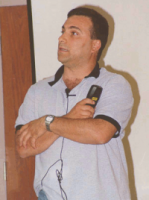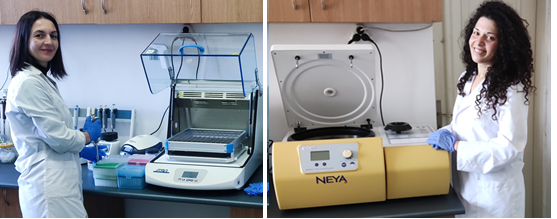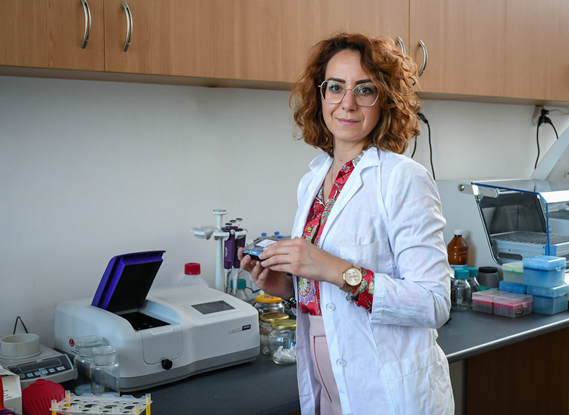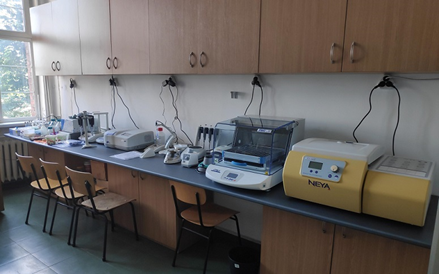Supervisor: Prof. Dr. Robert Penchovsky
room. 363
Address: 8 Dragan Tsankov Blvd., Sofia, Bulgaria, 1164,
Faculty of Biology, Sofia University "St. Kliment Ohridski,"
phone: 02 816 73 40
e-mail: robert.penchovsky@biofac.uni-sofia.bg
The Laboratory of Synthetic Biology and Bioinformatics was established in 2023 under the guidance of Prof. Dr. Robert Penchovsky. Here, he conveys the experience and knowledge he acquired in Europe and the USA, which he interweaves with innovative approaches in real and successful synthetic biology and bioinformatics studies. This is a fundament for the excellent realization of the students through their acquired knowledge and practical skills in important areas of Modern Biology, Pharmacy and Medicine.
Prof. Dr. Robert Penchovsky lectures on Automated DNA Selection in Cascade Microfluidic Chambers at the DNA7 Conference, USF, Tampa, FL, USA
To date, Prof. Penchovsky is the head of 12 projects, most financed with large budgets. This allows his students and young scientists, under his guidance, to touch modern science on the territory of the Faculty of Biology, Sofia University "St. Kliment Ohridski" and participate in studies that are highly evaluated by impact journals such as Nature Biotechnology, Nature Methods, ACS Synthetic Biology, RSC Chemistry World, etc. For example, the project "Design and experimental validation of chimeric antisense oligonucleotides as antibacterial agents" (contract ДН13/14/20.12.2017 with FNI) is one of the most successful projects in Bulgaria. Its results are presented in 20 publications with an impact factor of 56 points, Q1-4 -254, and more than 90. PhD students and young scientists participating in the project presented two presentations and four posters at three international conferences - https://www.uni-sofia.bg/index.php/novini/novini_i_s_bitiya/nauchen_proekt_po_bioinformatika_razkriva_nova_tehnologiya_za_otkrivane_na_antibiotici. Prove of the systematic work of the head of the laboratory, is also the fact that for the last five years, six young scientists defended their doctoral theses under the supervision of Prof. Penchovsky. For the last 12 years, seven masters in Molecular (Genetic) and Cell Engineering and nine in Genetics and Genomics in English and Bulgarian defended their Master's theses. Among them, there are people of 5 different nationalities.
Currently, Two PhD students - Antonia Georgieva and Vanya Dyakova- are enrolled in the laboratory.
Doctoral students Vanya Dyakova and Antonia Georgieva conduct experiments in the Laboratory of Synthetic Biology and Bioinformatics.
In 2021, Antonia won the First Prize of the national competition "Young and energetic scientists" in the category of doctoral students, and in 2022 was awarded second place in the competition for start-up companies EWA 2022 in Bulgaria, organized by the Regional Agency for Entrepreneurship and Innovation.
Part of the laboratory is Assistant Professor Martina Traykovska, Ph.D., who has shown a deep interest in the field of synthetic biology during her studies. Under the guidance of Prof. Penchovsky, she defended her Master's thesis and then her doctoral thesis. Over the past five years, he has successfully led exercises in the disciplines: "Molecular Genetics," "Synthetic Biology," "Introduction to Bioinformatics" and "Bioinformatics and Molecular Evolution" and led scientific projects aimed at the design of antisense oligonucleotides to target sites of multi-resistant pathogenic bacteria infecting humans.
Martina Traykovska is an assistant professor in the Laboratory of Synthetic Biology and Bioinformatics, Faculty of Biology, SU "St. Kliment Ohridski." The photo was used in her interview for Business Global magazine, no. 6 (34).
Research activity
The members of the laboratory lead courses covering topics from Molecular Biology, Genomics, Genetic Engineering, Synthetic Biology, Computational Biology, and Bioinformatics to Bachelor's, Master's, and Postgraduate students. The following is a description of the disciplines and majors for which they are read:
Courses for Bachelors:
- "Molecular Genetics" (mandatory) for IV-year students of the Molecular Biology major
- "Introduction to Bioinformatics" (mandatory) for students in the 3rd year of the Agrobiotechnology major
Courses for Masters:
- "Bioinformatics and Molecular Evolution" (mandatory) for students in the first year of the Master's program Genetics and Genomics (in English and Bulgarian) and Gene and Cell Engineering (in Bulgarian)
- "Synthetic Biology" (mandatory) for students in the first year of the Master's program Genetics and Genomics (in English and Bulgarian) and Genetic and Cell Engineering (in Bulgarian)
- "Genomics" (mandatory) for students in the first year of the Master's program Genetics and Genomics (in English and Bulgarian) and Gene and Cell Engineering (in Bulgarian)
Postgraduate program - Modern Aspects of Biology: Bioinformatics, Genomics and Synthetic Biology":
The postgraduate program headed by Prof. Robert Penchovsky is a group or individual form of training for students, bachelors, and masters, from all specialties with a minimum requirement of a "professional bachelor's" diploma or any other higher educational degree, including "bachelor's," "master's," or "doctor." It is particularly suitable for specialists in natural-mathematical sciences, medicine, and pharmacy who want to gain in-depth knowledge in important directions in the development of modern biology, such as Bioinformatics, Genomics, and Synthetic Biology. The study duration is six months in individual or group part-time. Graduates of the program will acquire theoretical knowledge and practical skills in some of the most relevant areas of modern natural sciences, namely Bioinformatics, Synthetic Biology, and Genomics.
Laboratory experiments. Equipment and reagents
The laboratory has all the necessary equipment and all the necessary reagents for conducting laboratory experiments. Fast and accurate systematized bioinformatics approaches, combined with validated experimental methods, allow accurate planning of studies and their timely and effective application.
The main pieces of equipment are in the Laboratory of Synthetic Biology and Bioinformatics.
Exogenous control of gene expression: Novel universal strategies for exogenous control of gene expression, cell fate reprogramming, and anticancer therapies are being developed in the laboratory. Complex networks are created to control gene expression (our plasmid pRS414ge-sequence) that implement allosteric ribozymes called designer riboswitches. They function as Boolean logic gates, both in vitro and in vivo, sensing the presence of predefined oligonucleotides (short DNA and RNA fragments)—all designer riboswitches, with wide applications in the pharmaceutical and biotech industries.
High-throughput screening of key RNAs or proteins: In the laboratory, we also apply our strategy for computational high-throughput screening of key RNAs or proteins with known 3D structures for drug development. The approach uses highly parallel computing platforms and can rapidly test millions of compounds, greatly reducing the resources spent on drug discovery.
RNA biology and riboswitches: After experimentally testing the putative function of non-coding RNAs and participating in the development of high-throughput screening arrays for the discovery of antibacterial drugs using RNA targets, Prof. Penchowski continues his research in the field of the design of antisense oligonucleotides that target sites from the bacterium's genome, to achieve a bacteriostatic or bactericidal effect.
Biosensor Engineering: Prof. Penchovsky develops biosensors based on designer riboswitches for molecular diagnostics and computing. Such biosensors function as nanodevices that sense the presence of predefined molecular signals and execute complex logic circuits. Integrating these biosensors with microflow reactors is a promising approach to my analytical applications to nanobiotechnology.
Bioinformatics applications: Prof. Penchovski's laboratory is intensively working on optimizing the work of scientists, and for this reason, we currently have designed 15 basic and very useful bioinformatics applets, a database of basic riboswitches and programs for the computational design of allosteric ribozymes ( https://penchovsky.atwebpages.com/applications.php).



